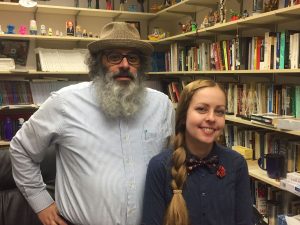
Using various items as symbols of history, like a leather cap and goggles, surfboards, ceramic pots, a quirky, yet space-age sound, student animation and over a hundred interviews—Professor Robert Cassanello created a podcast.
Listeners all over the world click on “A History of Central Florida” to take on a journey of social discovery and exploration of things that enable people from Central Florida and beyond to establish a deeper connection with history. Cassanello uses the podcast medium as a tool that he and his students can use to produce the multimedia.
“Podcasting is kind of a democratized medium,” Cassanello said. “You don’t need a studio, you don’t need a radio station, you just figure out how to record and if you can figure out how to edit you can create a podcast.”
Dr. Robert Cassanello teaches history at UCF, using his podcast documentaries, with his primary focus on social history. The documentaries won him the Hampton Dunn Award four years in a row, which is awarded to the best media project concerning Florida.
One of Cassanello’s major projects was “A History of Central Florida” and the podcast was scripted with the aid of his nine students and produced by eight of them. The podcast was 50 episodes, 15 minutes long or less, narrated by the students and created with Central Florida as a historical backdrop.
Each episode begins with an item like Mickey Mouse ears or tapestries to introduce the historical background of each story. Cassanello’s goal was to teach the students by showing them how to communicate history through textual analysis. Doing so would allow the content of the podcast to connect with any age group.
“Take the object and make it relatable,” Cassanello said. “For example, each student in the beginning of each episode had to explain why that one object is worthy of representing history at some point in time. Every object is an everyday object; every object is something that would have been consumable every day.”
Cassanello highlights how they had objects like the Windover items in episode one that date back 9,000 years—well before “Florida and Spanish” was established. And through that discovery he found that the podcast is more than just Florida history its global history.
“There’s no Florida then, there’s no Disney then, there’s no I-4 corridor—how’s it Florida,” Cassanello said. “These people lived not conscious of this place being called Florida so it was a really good starting place for us to say, OK this is really about world history, global history—these were people who didn’t exist in the context of a nation or country or citizenship.”
When it comes to who is listening to the podcasts, its overall reach has lived up to Cassanello’s goals of connectivity and accessibility. There have been 4,497 total downloads from Hawaiian Gardens, California all the way to India.
Cassanello’s success in podcast development and structure has even caught the attention of current graduate student, Holly Baker. Baker has a bachelor’s in history and she’s currently working on her master’s in the same field. Cassanello is helping her frame her own podcast that will focus on music during the depression, specifically 1935 to 1940. She will use her thesis as a script much like Cassanello did to create the content.
Baker believes that podcasts allow you to establish the narrative that you want as you disseminate the information.
“I was intrigued by that because I was like maybe you can view history through music that’s when I decided to do a podcast series,” Baker said. “It allows you to weave a narrative in there. The story telling abilities are emphasized and when you’re doing a traditional thesis it’s 80 pages long but it’s for an academic audience so I want to do reach more people—podcasting goes hand-in-hand with that I think.”
In his classes, Cassanello looks to challenge students to look beyond the geographic identity of the history of a place and view it from a wider perspective. For Cassanello as a social history professor, who’s been listening to podcasts since 2005, the most important factor about a podcast is that it must be relatable.
“Someone living in japan, someone living in Australia or Bolivia can watch this and get something out of it,” Cassanello said. “Say, ‘oh I understand what it means to be connected to a global tourist economy’ … each and every episode has a universal theme. It’s not so much Florida—Florida is only a location Florida is not a subject.”
Read the original article.
Photo by Christopher Davis.
Featured in the photo: UCF History professor Robert Cassanello poses with his podcast understudy, UCF graduate student Holly Baker in Colbourn Hall on Sept. 28.